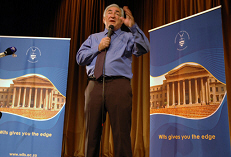
Typical street scene in Santa Ana, El Salvador. (Photo: iStock)
IMF Survey: Africa Rebounding Almost in Line with World Recovery
March 10, 2010
- African countries used fiscal stimulus to support their economies
- Africa recovering at almost same pace as rest of the world
- Problems are manageable with help of donors, IMF
IMF chief Dominique Strauss-Kahn said he is optimistic about Africa’s economic prospects in the wake of the global economic crisis that hit African economies along with those of the rest of the world.

Strauss-Kahn talks to students at the University of the Witwatersrand in Johannesburg. He is on a tour of three African countries (Photo: Simon Willson/IMF)
Strauss-Kahn visits Africa
He said that for the decade before the global crisis, Africa's economies had been strengthened by good policies that had given Africa's governments the fiscal space to cope with the crisis.
The IMF chief is on a trip to Kenya, South Africa, and Zambia to meet political, business, and civil society leaders and assess the impact of the global economic and financial crisis on Africa.
Speaking March 9 at a town hall meeting in an auditorium at the University of the Witwatersrand in Johannesburg, Strauss-Kahn said “Africa is back.”
"The policies which have been implemented by African governments to cope with the crisis were appropriate and timely. They were able to help their own economies and support their own economies exactly in the same way as emerging markets did, using fiscal stimulus."
After summarizing the causes and effects of the global crisis, Strauss-Kahn outlined what the IMF had done to help counteract its effects, including calling for a global fiscal stimulus. He stressed what he termed the IMF's "unseen" support for its members through technical assistance, noting that by the end of 2010 the IMF would have five regional technical assistance centers operating in Africa.
He said the credit for Africa's improved performance in coping with global crisis belonged to Africa's governments. "Usually, when you have a crisis, African countries' recovery is a little late and lags far behind the recovery in the rest of the world. It's not true today,” Strauss-Kahn stated. “Recovery is taking place in Africa almost at the same pace as in the rest of the world."
In remarks and a question-and-answer session in front of around 200 students, faculty, and community leaders in South Africa’s largest city, Strauss-Kahn reflected on what he had heard on his visit to Kenya a few days before: the strong sense that Africa's destiny will be driven by Africans--not by others.
“So I am optimistic for what's going on in Africa these days. Africa is back. There are problems looking forward, but most of these problems are at least manageable with the help of donors, and of the IMF.”
Strauss-Kahn also noted that another topic had loomed large during his discussions in Kenya: the issue of good governance.
"You may have, on paper, the best kind of economic policy you need. If this is badly implemented because of corruption, because of bad governance then, of course, you can't expect to have the result that you deserve," Strauss-Kahn said.
Questions from the audience included the issue of deregulation of the South African economy, global regulating standards, and African regional integration.
On the first leg of his trip in Kenya, he also attended a panel discussion at the University of Nairobi. Speakers included Kenya’s Prime Minister Raila Odinga, Finance Minister Uhuru Kenyatta, environmental activist and Nobel Prize winner Wangari Maathai, rock star and political activist Bob Geldof, and Transparency International’s Akere Muna.
Comments on this article should be sent to imfsurvey@imf.org


